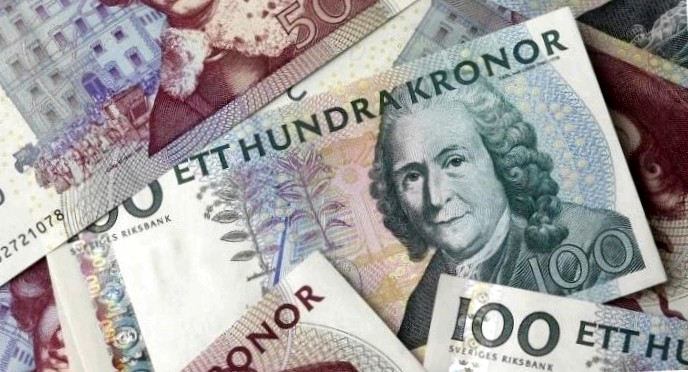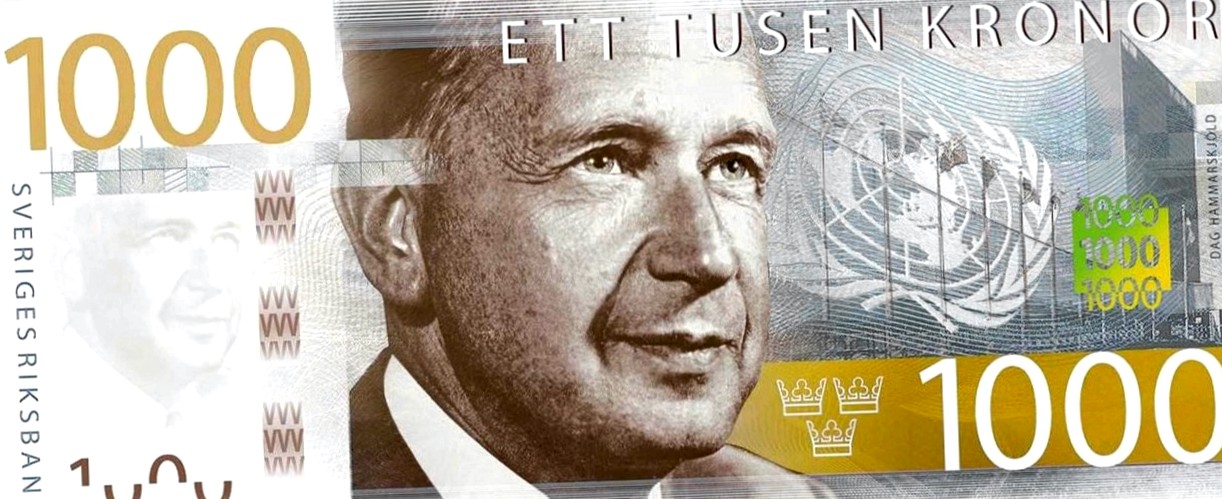
Old banknotes. Image: www.Riksbank.sep
In many countries, cashless payment methods have risen, but also the circulation of cash. Sweden, however, is aiming for a rapid disappearance of munzes and seem
The Committee on Payments and Market Infrastructures of BIS (Bank for International Settlements) Consted Unleggest in a report that the use of cash cards and their number between 2000 and 2016 has risen. The cash cards were used for ever smaller payments. They are used most in Australia, Sudkorea, Sweden and the USA, with the smallest payments in Russia, Brazil and Sudkorea. In Germany, money cards are used comparatively little and the payment height is the slightest.
So you should think that with increasing card payments and the dissemination of digital worries the use of cash had to be accessed. But it’s just the opposite of the case. The circulation of cash in the investigated 22 countries in the same period will also be increased as well as only 2 points from 7 to 9 percent of GDP. The main reason is the economic growth in the rich countries, but it is in the "Emerging Markets" also to do with the number of available cash machines.
The big increase in Hong Kong and Japan recorded. In contrast, cash demand in China has fallen by 5 percent. In Sweden, cash circulation is only 2 percent of GDP. Iceland was 1.2 percent far below, Sweden, Norway and Danemark were 3-4 percent at that time. But the financial crisis has obviously strengthened the mistrust in cashless payment transactions and the cash circulation has risen with 2.4 percent of GDP again over the Sweden and Norway.
In Germany, cash continues to be the most popular payment
In most countries, the number of coarse banknotes – Switzerland has risen with the 1000-Franken-Schlichen the one, with the highest value – continuously increased, which rates as an indication that cash is increasingly used as a value system and less than payment funds: "Payments Are A-Changin ‘But Cash Still Rules." In Sudkorea and Russia, the number of coarse money tickets rose, during the small sank.
Sweden is again an exception, since since 2007, since 2007, the number of bills has been made and the country managing a cashless society, which has been aimed for a long time from the Sverige Riksbank, since no cash had to have more involved. After estimates, 25 percent of the handlers will no longer accept cash until 2020, 2025 should already be 50 percent.
Very different the situation in Germany. After a German bank study published in February "Payment behavior in Germany 2017" Strikes that cash "Furthermore the most popular means of payment" is. At 74 percent of the purchase paid with cash, but in 2014, however, there were still 79 percent. Being under 50 euros are usually paid in cash. 107 euros on cash should have the Germans average in the purse, what is meant to do much more with themselves. Since 2008, nothing has changed. Only relatively slowly the Germans rise to cashless procedures with cards, PayPal or immediate payments, but use increases. Nevertheless, 88 percent also want to pay with cash in the future, a cash disruption or confident is significantly rejected.

Image: www.Riksbank.sep
Politicians want to force rough banks to continue to accept and pay out cash
Apparently, the resistance to the intended trend towards cashless society is also increasing in Sweden. The Riksbank Committee in Parliament, which is stated in the control of the Central Bank, has recently proposed the support of all parties to force the large banks of the country to hold cash to its rapid disappearance. Many bank branches, business and restaurant do not have cash more and do not accept any more.
Greater banks with deposits of more than $ 8 billion of US dollars have continued to ensure that customers can withdraw and deposit cash. The deputies want such cash services of banks to be offered in a reasonable distance across the country. Maximum should be the next possible way to take off 25 km away – that’s already very far. But it does not matter how banks offer cash deposit, ie in a branch, with cash machines or on cash registers. If the editions were not respected, were penalions fally.
However, it is not clear whether the requirement of people after cash is so high, after a Rijksbank study, people pay more and more with cards or with mobile paying methods. On the question of which payment method you used in the last month, 2014 still 87 percent cash, 2018 only 61 percent. Credit card utilization is the same with 93 percent, the use of smartphones (swish), however, rose from 10 to 62 percent. Young people already use cash significantly less than ancient. Asked how they paid last purchase, only 13 percent with cash, 80 with a check map and 7 percent with a credit card. 20 percent do not get a cash more from a cash machine, only 6 percent will pick up or several times from a cash machine cash. It is still apparently relatively rare that you can not pay cash in farms.
A quarter of respondents said they found the disappearance of cash very well, for another 23 percent that was pretty good. In contrast, only 12 percent spoke out, rather negatively find the 15 percent, with which cash lovers were already in the minority. The proportion of the commodities of a cashless society has increased. At coarse resistance, the disappearance of cash in the rival population meets. Here, the 35 percent see very or more negative and 33 percent very or more positive.
In another survey commissioned by Bankomat, which are interested in cash, came out that 68 percent of respondents continue to have the possibility to pay with cash. In the 18-29 -0th years, this also says a majority of 56 percent, in which over 65-year-olds want 85 percent to hold on cash. It seems to get to arrive, who asks.
The banking association protests. Only to commit individual banks to cash, probably crisp against the laws and causes considerable costs for the six banks concerned. Even Riksbank boss Stefan Ingves warned that in crisis situations the absence of cash becomes problematic, for example, if the power has dropped. He demanded legal regulations of the payment system and a compulsion for banks, continue to deal with cash, but also the importation of a digital maintenance.